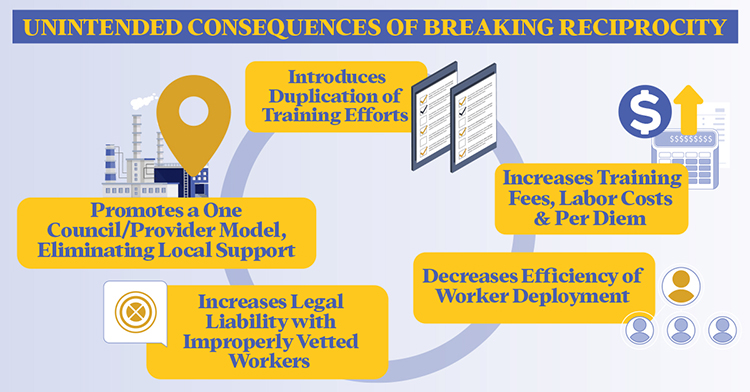Have you been asked to replace the Basic Orientation Plus (BOP) and BOP Refresher with another reciprocal course? When choosing a training solution to address OSHA’s process safety management (PSM) regulatory requirements, asking the right questions is key. Here are four questions you should consider when selecting a baseline course.
What is the training’s proven impact? A robust reciprocal program should have a demonstrated history of effectiveness. Since 1997, the Association of Reciprocal Safety Councils (ARSC), a national network of local safety councils, has administered the BOP and BOP Refresher courses. Since then, the courses have positively impacted over six million craftworkers. Ensure that the baseline training course you select delivers similar proven results.
Who owns and administers the training? For over 25 years, facility owners have relied on the ARSC network to certify that the workforce entering their facilities has been equipped with PSM training. ARSC is comprised of 56 training locations that work together to deliver reciprocal safety education that conforms to regulatory standards. Who better to entrust with the development of baseline training than a network of mission-driven, locally invested nonprofit organizations dedicated to doing what’s best for the industry?
However, shifting away from a proven system unravels the integrity of the reciprocal network and eliminates the input, autonomy and stewardship of local councils — along with their ability to serve local owners and contractors.
Does the training meet reciprocal standards? When choosing baseline training, consider whether the course content is applicable to the types of industrial facilities workers are entering. Training should also evaluate workers’ understanding of the material with a test score rather than relying solely on knowledge checks. Allowing inadequately vetted workers to complete the course without verifying their understanding can increase legal liability. Lastly, the proctoring method should be reliable, standardized and time-tested. These standards guarantee a consistent contractor onboarding process. No other baseline course matches or exceeds the rigor of the BOP and BOP Refresher. OSHA owns the regulatory standard and ARSC owns the reciprocal standard.
Is the training properly audited? Not all reciprocal training is created equal. Reciprocal training isn’t only about the course. Gold standard reciprocal training systems, like the ARSC network, also include an audit process that solidifies the integrity and legal defensibility of the training.
Options for training are good but be sure to do your homework. If you do choose an alternative baseline PSM training, be sure to add “or” to your business rules so workers don’t waste time retaking training. We know your time is important, so ARSC is working on a remote delivery option for the BOP/BOP Refresher to meet workers where they are.
